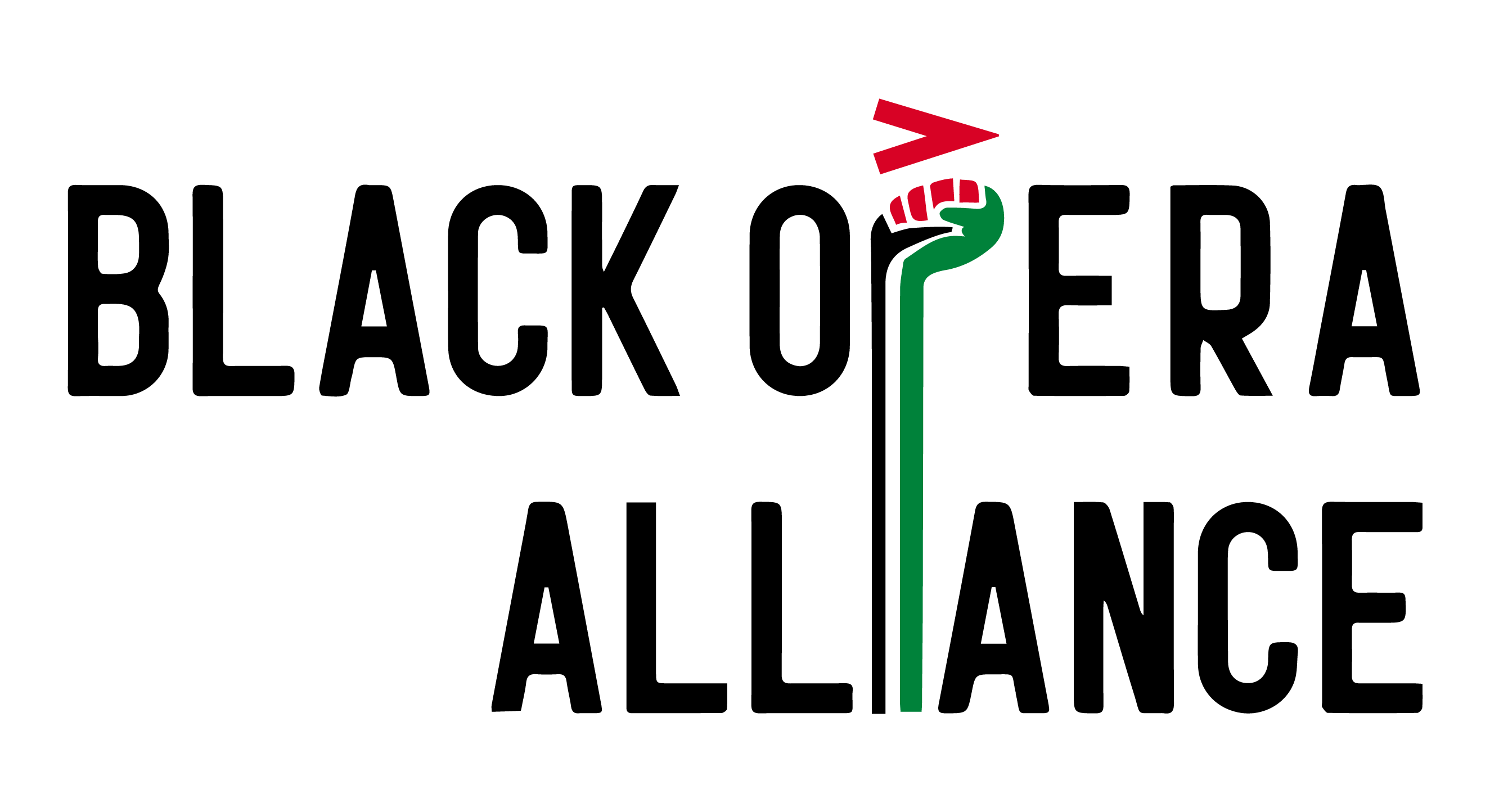Executive Summary – Key Findings
- 115 opera companies in the US were sent Black Opera Alliance’s “Pledge for Racial Equity and Systemic Change in Opera.” (The Pledge)
- 53% of US opera companies have responded “Yes” to The Pledge up from 48% in June 2021 and 2% have responded “No.”
- 98 opera companies received surveys from BOA requesting board and staff data.
- So far, there has been low participation completing the surveys, even with companies that have signed the pledge.
- • Opera staff and board members are mostly non-Black, confirming the inequities the BOA is seeking to change. 9% of Board Members are Black and 8% of staff are Black.
Introduction
BOA and TRG Arts have partnered to further BOA’s mission to expose racial inequity and under-representation of the African diaspora in all facets of the opera sector and promote reform. To achieve this, BOA and TRG Arts are tracking the progress that opera companies in the US are making towards the eight areas of needed transformation defined in The Pledge released in September of 2020.
As the opera field seeks out truer equity, inclusion, and racial justice, this framework provides specific requirements and timelines. BOA is eager to understand the impact and progress of The Pledge. To share how progress is being made, BOA and TRG are studying this progress and are releasing insight reports to share the learnings.
Of the 115 opera companies, the largest portion of responses, 53%, have confirmed commitment. This is an increase from 48% from when this data was last reported in the fall of 2021. The second largest group, 37%, have responded, but have not yet committed. 8% have not responded, down from 16% in the last report. 2% of opera companies who received the pledge have declined to commit.
Historically, the lack of industry-wide accountability has been a prime culprit in stalling substantive industry evolution in the EDI space. These reports aim to shine a spotlight on how and where the sector is making gains. BOA and TRG Arts are also committed to helping the opera sector understand how to apply these data points to aid in journeys of improvement. To facilitate industrywide learning, BOA and TRG Arts also host webinars to review each insight report and discuss take-aways and action items.
Scope of this Report and Data Sources
BOA and TRG Arts’ reporting is informed by two data sets that include responses from opera companies to The Pledge and to surveys sent out by BOA asking opera companies to report the racial make-up of their Boards, artists, and staff. Commitments to The Pledge.
To obtain the survey data, BOA and TRG created a data workbook that was sent to opera companies with a request that they fill it out and send it back to BOA. Not every workbook returned to BOA was filled in completely. To address these, BOA has conducted independent research to fill in blanks, when possible.
The first data set represents 115 opera companies across the US. The second data set is taken from a survey sent to 98 companies. There was a 19% response rate for the information requested regarding Boards. The response rate number climbs to 28% if just analyzing participation from opera companies who signed The Pledge. For the data requested regarding staff racial make-up, the response rate was 22%. This increases to 36% among Pledge signatories. Also included in this second data set is artist and production information. 34 surveys were returned to BOA with varying degrees of completeness. Of these 34, 15 were from organizations with direct ties to BOA members.
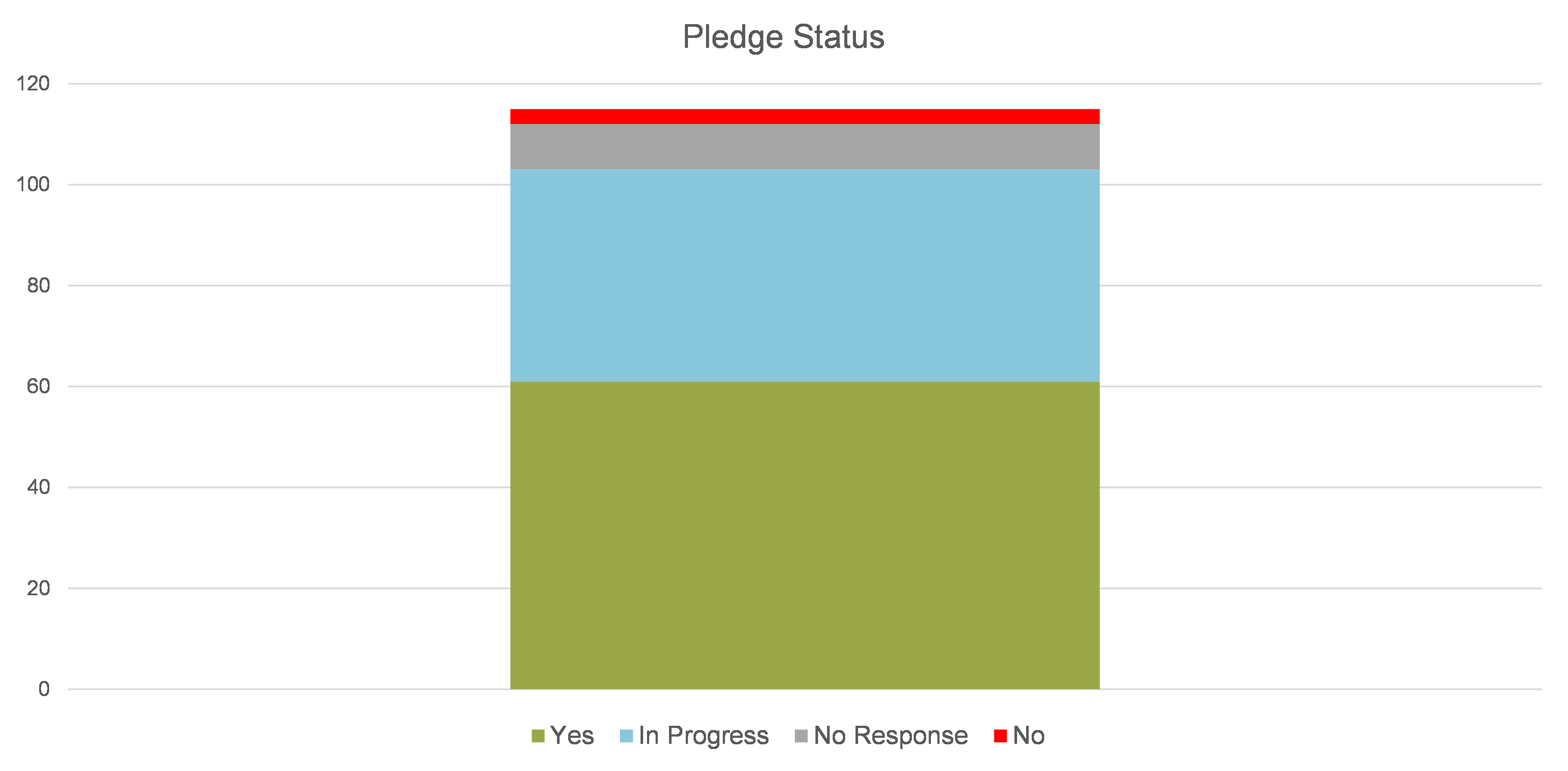
Levels of Commitment to The Pledge
Of the 115 opera companies, the largest portion of responses, 53%, have confirmed commitment. This is an increase from 48% from when this data was last reported in the fall of 2021. The second largest group, 37%, have responded, but have not yet committed. 8% have not responded, down from 16% in the last report. 2% of opera companies who received the pledge have declined to commit.
Board member data completeness low
28% of companies who signed the pledge participated by giving board member data.
9% of Board Members are Black; 14% are non-white
Among the opera companies that responded to the survey, this data reflects a slightly higher percentage of Black Board membership (9% Black) comparative to all non-profit boards* (7.5% Black). 14% of respondent opera boards are non-white.
Black represetation on Boards relatively new
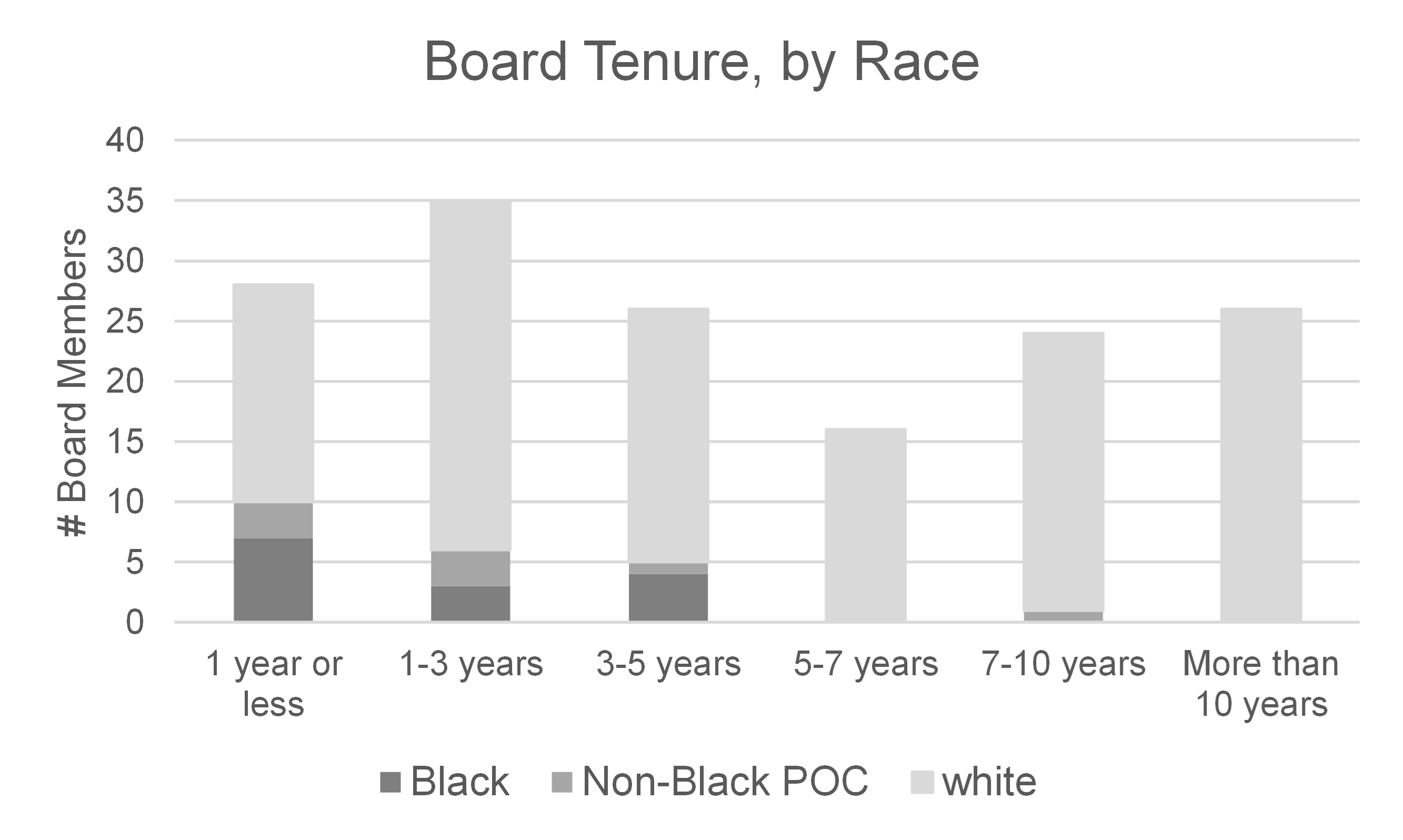
Among the opera companies that responded to the suvey,16% of Board Members serving are Black, and all Black board members from companies participating in this survey have been serving 5 years or less.
Newness of Black representation limits role diversity
Most Board Members serve 1-2 roles during their tenure while others serve in several roles. Proportionally, Black role diversity during board tenure is limited due, at least in part, to the recency of Black board representation.
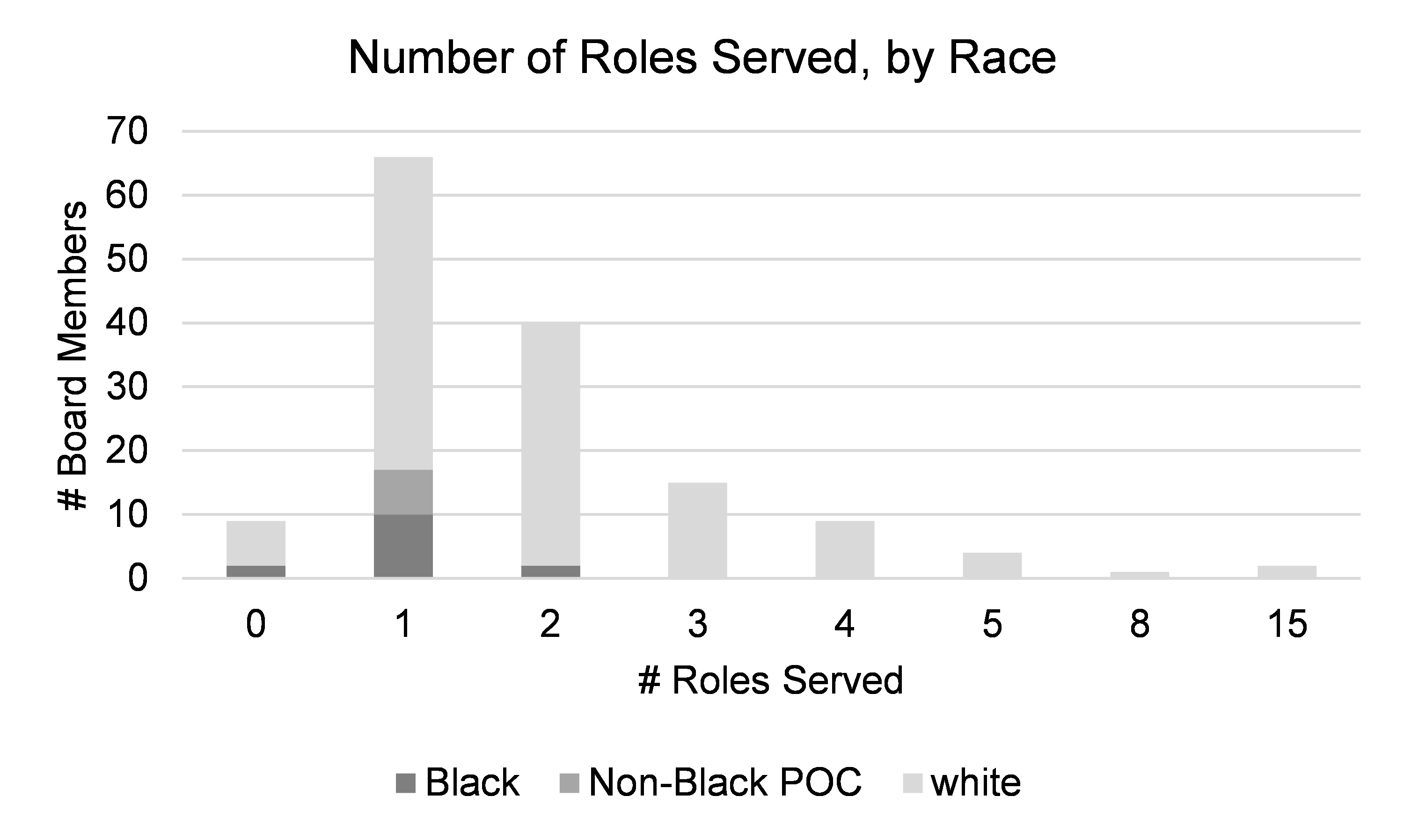
84% of opera boards are not representative of the racial make-up of their community
75% have proportionally fewer Black members than the percentage of Black people in their communities.
Staff member data completeness low
36% of companies who signed the pledge responded to the survey about staff racial make-up.
8% of staff members are Black; 16% are non-white
Opera reflects a slightly lower percentage of Black staff membership (8% Black) compared to Black Board membership (9% Black). Inversely, the broader non-white representation among staff membership is slightly higher (16%) comparative to non-white board membership (14%).
Black representation on staff teams is growing
Black staff represent 20% of all new hires made last year.
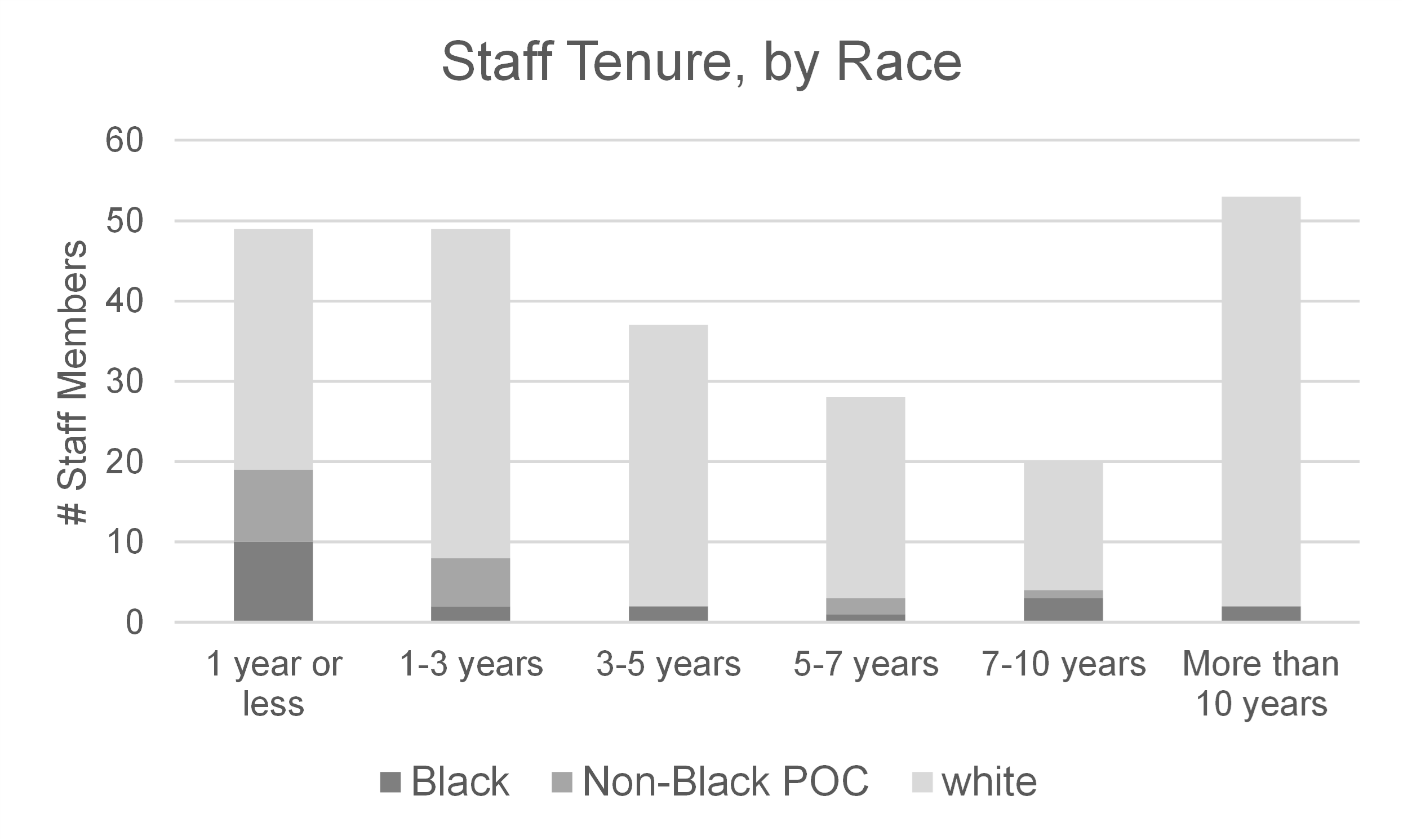
Black professionals more likely to be in Community Engagement & EDI Departments
Examining professional representation across the participating companies demonstrates that Black professionals are disproportionately represented in EDI and Community Engagement Departments. 50% of EDI roles are held by Black professionals and 24% of Education and Community Engagement roles are held by Black professionals.
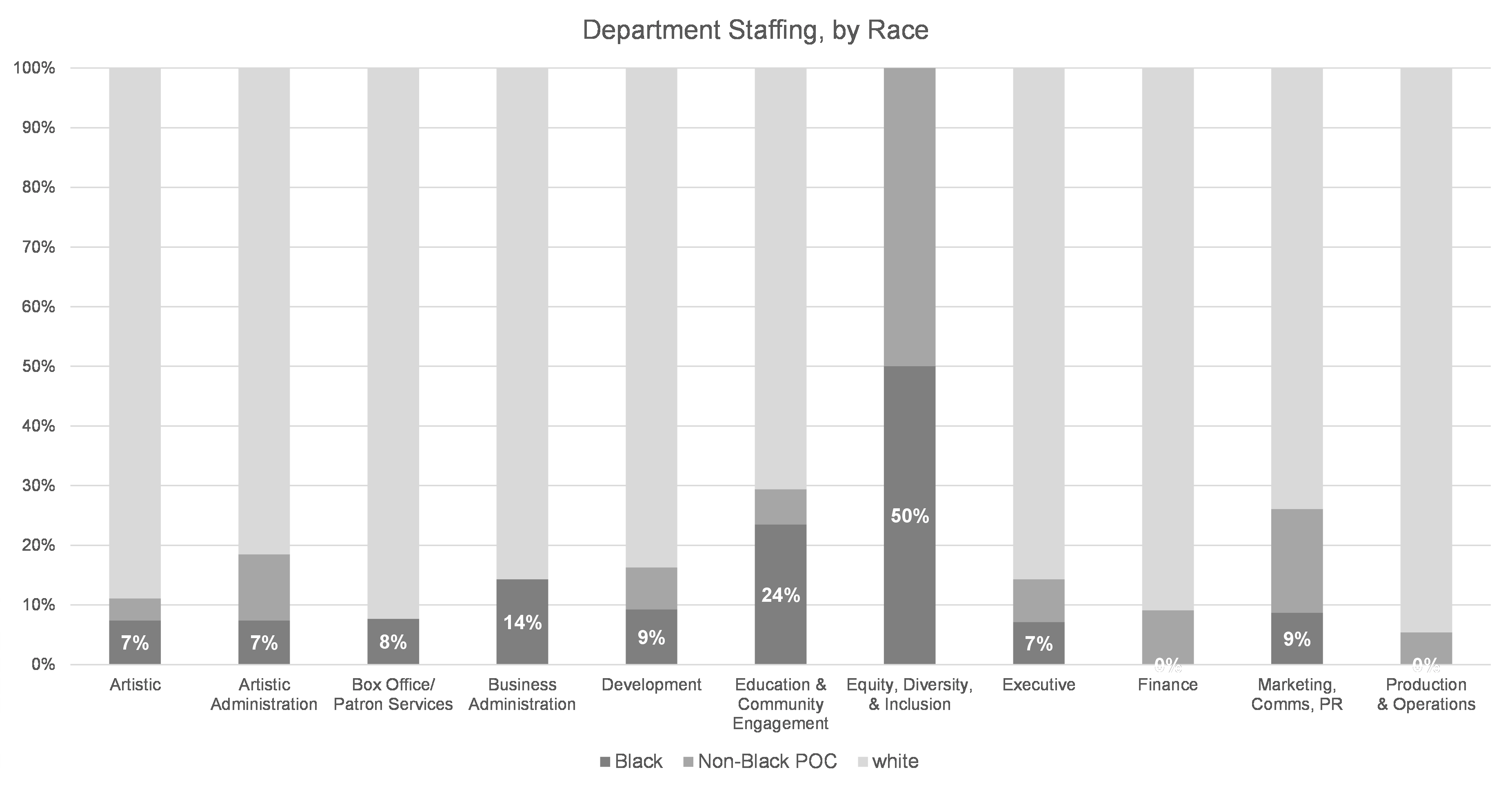
Pipeline for intra-organization growth limited
Looking across departments at the tenure of Black professionals reflects limitations in intra-organizational growth. Data shows that most Black professionals have a tenure of less than 4 years. While hiring of Black professionals in the Opera sector is growing, opportunities for intra-organizational growth have remained limited. 88% of role changes were awarded to White staff and 3% awarded to Black staff, which is proportionally lower than other groups.
At the leadership level 4% of Executive positions were filled by Black professionals and more broadly the Senior Staff level comprises 9% Black professionals.
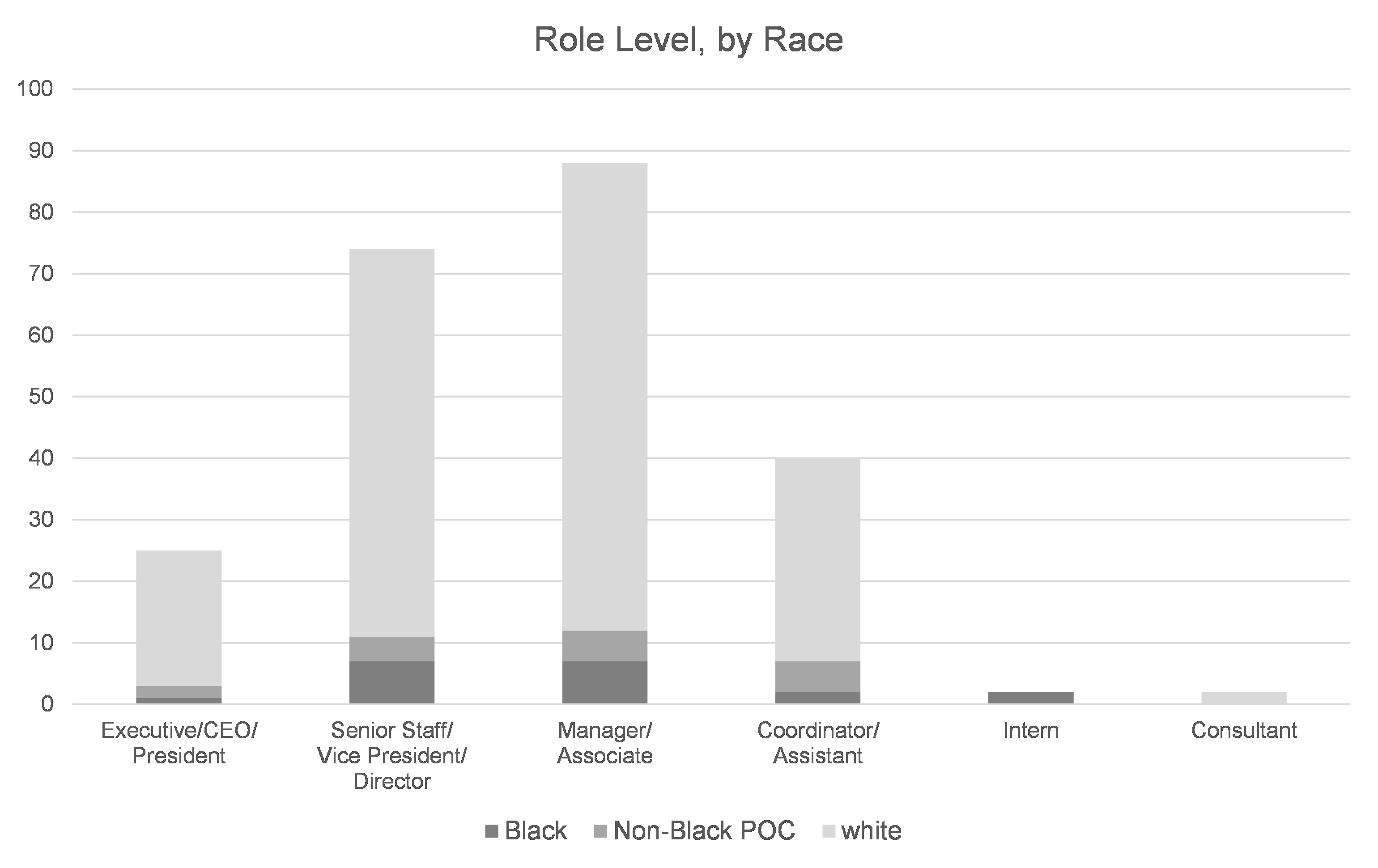
87% of opera staff are not representative of the community
Only 13% of company staff reflect the BIPOC racial make-up of their communities. Examining specifically the Black community demonstrates that 83% of companies have proportionally fewer Black staff members than their community make-up.
Conclusions and Next Steps
This study was undertaken to provide further insight on the progress of Pledge signatories towards its eight areas of transformation. BOA intends to use this analysis to continue the data-informed conversation with the opera sector and provide the necessary accountability in achieving change. By examining administrative and Board roles along with artist demographics, we get a clearer picture of how the genre of opera is progressing toward equity of opportunity, and efforts of each company to represent their respective communities and where and how change is happening.
Black representation on Boards and in leadership roles within participating opera organizations is still new, as all participants in this survey who have a Black Board Member have had them in their positions for less than five years. While this is an eye-opening statistic, increase in Black leadership along with an increase in Black staff hires(20% last year) are indicators that some progress is taking place.
While any participation is appreciated, BOA relies on full data requests being returned by the surveyed companies to form accurate assessments and reports on progress and areas of need. Many companies, including signatories, did not provide complete data which impacted the size of the data-set studied in this report and doesn’t support BOA’s efforts.
Reflecting on this report, Garrett McQueen, Communications Team Lead at Black Opera Alliance, offered this statement and update on BOA’s plans:
“In our work, we encourage opera companies to understand why Black communities across the country have specific needs that will address the foundational harm of anti-Black capitalism and historical servitude in the United States, and how those things have manifested within subcultures of America including the opera industry and western classical music."
"Currently, BOA is moving toward centering our own constituency. With the partnerships and relationships we’ve garnered we use data cultivation and the “card” system to find the opera companies that are actively dedicated to racial equity and that we deem safe for our members. Inclusion of diverse perspectives in opera has grown since 2020, and BOA continues to help institutions focus their perspectives and sensibilities around the needs our most diverse communities and marginalized peoples.”
BOA and TRG Arts are committed to providing support and partnership with the opera sector to aid with synthesis, understanding, and learning from these insights.
Black Opera Alliance (BOA) and TRG Arts have partnered to further BOA’s mission to expose racial inequity and under-representation of the African diaspora in all facets of the opera sector and promote reform. To achieve this, BOA and TRG Arts are tracking the progress that opera companies in the US are making towards the eight areas of needed transformation defined in The Pledge released in September of 2020.
As the opera field seeks out truer equity, inclusion, and racial justice, this framework provides specific requirements and timelines. BOA is eager to understand the impact and progress of The Pledge.
To share how progress is being made, BOA and TRG will be releasing ongoing insight reports through 2022. Historically, the lack of industry-wide accountability has been a prime culprit in stalling substantive industry evolution in the EDI space. These reports will shine a spotlight on how and where the sector is making gains. BOA and TRG Arts are also committed to helping the opera sector understand how to apply these data points to aid in journeys of improvement. To facilitate industry-wide learning, BOA and TRG Arts also will host webinars to review each insight report and discuss take-aways and action items.
In this episode of TRG 30, Jill Robinson is joined for a conversation with change agents Dr. Derrell Acon and Ibukun Babalola from the Black Opera Alliance for provocative thinking and ACTION to address systemic racism in the sector. The BOA's pledge has laid out specific actions for organizations, created transparency for artists, and built a community rooted in collaboration, data and activism.”
Download the Presentation Slides
Black Opera Alliance
The mission of the Black Opera Alliance (BOA) is to empower Black classical artists and administrators by exposing systems of racial inequity and under-representation of the African diaspora in all facets of the industry and challenging institutions to implement drastic reform. BOA was founded in the midst of the current pandemic out of a need for support and action when opera professionals around the world are out of work and the Black population is disproportionately affected by COVID-19 and economic hardship. Alongside the protests of the Black Lives Matter movement, Black opera professionals and others who support equity have decided that the time for change is now.
Find out more about Black Opera Alliance